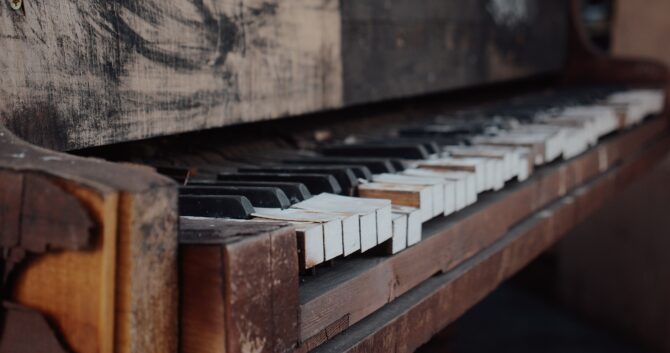There’s always some debate about how you can spell a word. There are old spellings, regional differences, and even different ways of making the same word plural! English has some pretty complicated grammar rules, and we see this very clearly with the plural for “piano”, and for a long time, the debate has been “pianos vs pianoes”.
Table of Contents
- What Is The Difference Between Pianos vs Pianoes
- Why Is English Grammar So Strange?
- Where Does The World Piano Come From (And Why It Matters)
- How To Make Words Ending In “O” Plural?
- How You Can Still Use Pianoes
- Wrapping Up Pianos VS Pianoes
You make the plural for piano by adding an “s” to the end of the word. This creates “pianos” which is the accepted plural form. However, people still use the archaic form “pianoes” to make this plural.
Let’s take a deep dive into how we form plurals and what makes the plural for piano so special.
What Is The Difference Between Pianos vs Pianoes
The difference between pianos and pianoes is spelling. Pianos is the currently accepted correct way to make this plural form while pianoes is an archaic spelling that is no longer widely used. This doesn’t make “pianoes” wrong per se, but it does mean you have to be careful about how you use that spelling.
You’ll need to know English grammar for the plural of pianos whether you’re buying the best beginner keyboard or you’re just trying to win big at trivia night. This will help you figure out spelling mistakes and give you a great insight into how the history of grammar has changed over time. As cultures interact with each other, the English language has changed a lot over the centuries!
English grammar can get pretty tricky and spellings are where we see this getting the most complicated. Grammar isn’t a stable set of rules, but rather a set of guidelines that is in flux over time. What is grammatically correct today might not be grammatically correct tomorrow.
Why Is English Grammar So Strange?
Learning English isn’t like learning to read sheet music. Sheet music is consistent across musical styles and cultures. However, English grammar is a bit of a mess that is constantly changing as new people adopt this language.
English has become a global language. People from all over the world learn English to speak with companies and people who are English-speaking. This creates a complicated game of linguistic telephone that constantly changes how people approach and use this language.
English has borrowed words from German, French, Italian, and countless other languages. It uses romance language vowels along with Germanic vowels. It also borrows grammatical conventions from both systems.
All of these factors come together to create a grammatical system that is fairly inconsistent when you don’t know this complicated historical change.
Where Does The World Piano Come From (And Why It Matters)
Usually, you make a word that ends in “O” a plural by adding “s” or “es.” It can be hard to tell which to pick, but there is a trick that can solve our piano problem.
Piano is a borrowed word. This means that it does not originate in the English language, but instead comes borrowed from another language. In this case, piano is an Italian word.
Italian words that end in “O” are made plural by simply adding an “s.” Casinos is a great example of this. When the word originates in Italian, it uses the simple “s” ending to create a plural.
Pianos have a history stretching back for hundreds of years overseas, but you can still find great piano lessons here in the States. The history of how we write about pianos has a lot to do with the history of these instruments. Pianos, and classic music in general, borrow a lot of their history from Italy.
Borrowed words often have their own grammatical rules. They usually adopt either the plural forms from their native language or they take on a consistent rule set in English. This is the big reason why we don’t spell pianos as “pianoes.”
How To Make Words Ending In “O” Plural?
There are other odd tricks in English grammar that allow us to make plurals of words ending in “O.”
As a general rule, most borrowed words use the simple “s” ending to create a plural. This keeps the borrowed words intact and allows us to easily move it into the English grammar systems. Words like avocados, casinos, and pianos all share the same plural form because they are all words borrowed from other languages.
However, things change when we look at other words that end in O. There are a few words that can trick you into thinking that their ending is “oes” rather than just “s.”
Foes, toes, and shoes all look like they use the “oes” ending. However, these plurals actually just use an “s” ending. These are words that already end in “oe” which makes it look like they are using more complicated plurals than they actually use.
There’s another trick that we can look at when it comes to making use of the “pianoes” way of spelling things.
How You Can Still Use Pianoes
English has changed a lot over history. This has created an entire system of “old school” spellings that can still get used today under special circumstances.
These are formally known as archaic spellings. A word is considered archaic if it is no longer used in common speech or writing. These words aren’t very popular anymore, but they do pop up.
Let’s take a closer look at our other spelling option: “pianoes.” It might seem like there is no way to use this spelling, but you can actually get away with it fairly easily.
Archaic spellings can be used in context. We’ve used “pianoes” throughout this blog as part of an explanation about the history of the plural of piano. You could also have a story set in the past that uses archaic spellings to help set the tone of the story.
Archaic spellings aren’t that common, but they can be a great way to add a little flare to your writing when appropriate. The next time you’re writing from the perspective of a historic character, feel free to get a little creative and use these outdated spellings. They might not be accurate anymore, but they still have plenty of usage.
Archaic spellings give us insight into how the English language has changed over time!
Wrapping Up Pianos VS Pianoes
Let’s wrap up the distinctions between the different ways to make the word “piano” plural. We’ve covered anything from the history of classic music through the history of English grammar.
The beauty of playing piano is that you can teach piano to toddlers and adults! The same is true about grammar and learning multiple ways of making words plural. We use the plural “pianos” because the word piano is a borrowed word from Italian, and we give all Italian borrowed words the regular “s” plural form.
The history of playing the piano is rich and spans cultures and continents. The next time you go shopping for a great piano, you’ll know how to use the right plural form!




